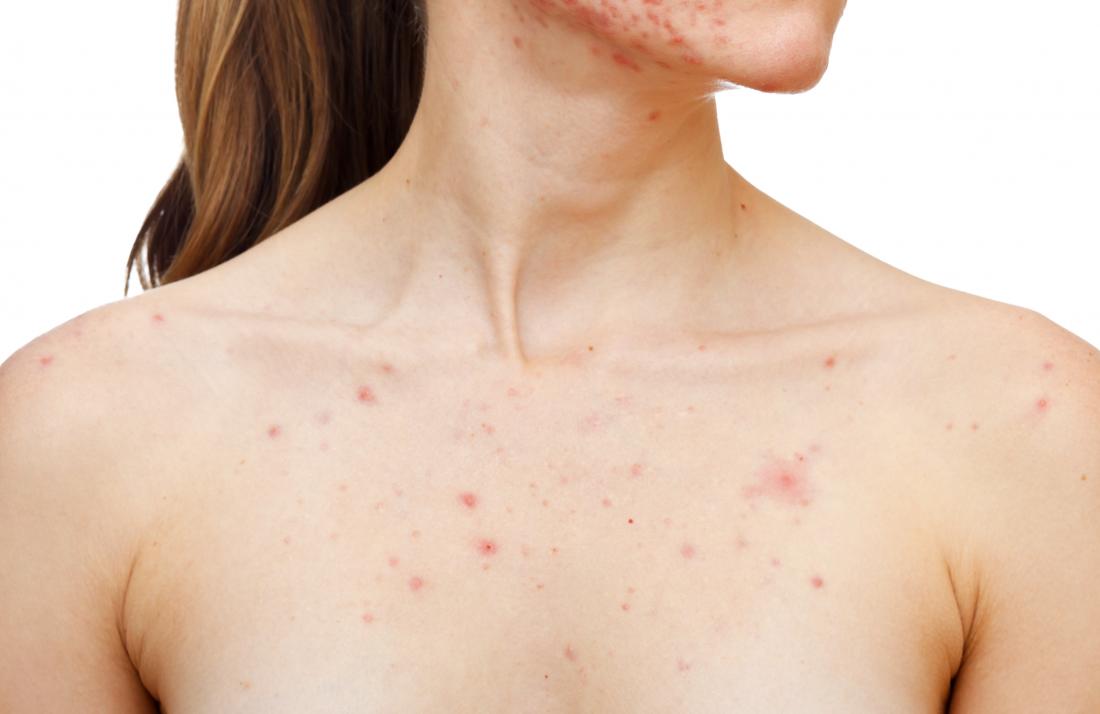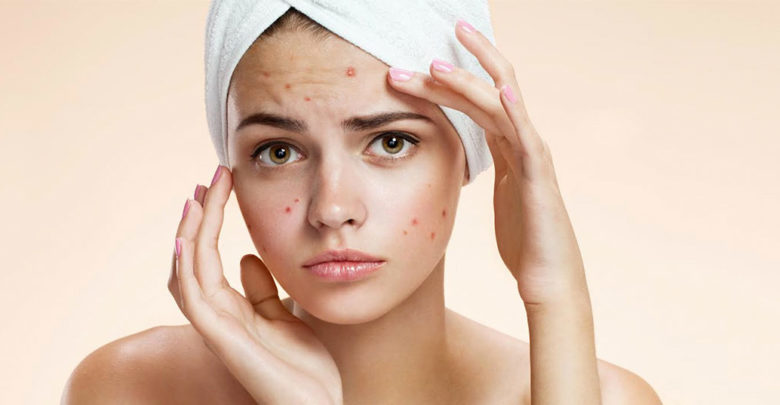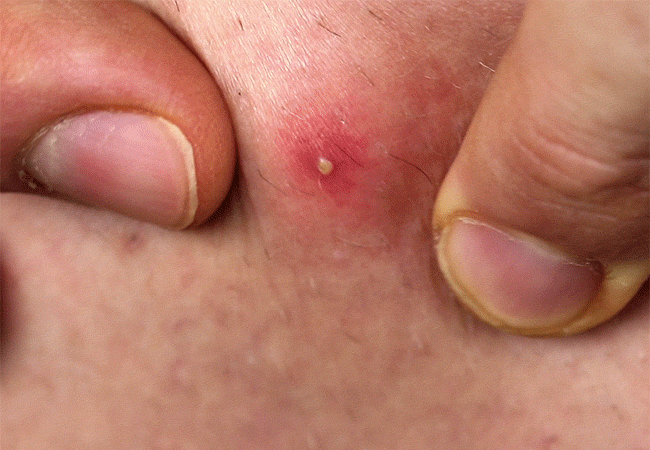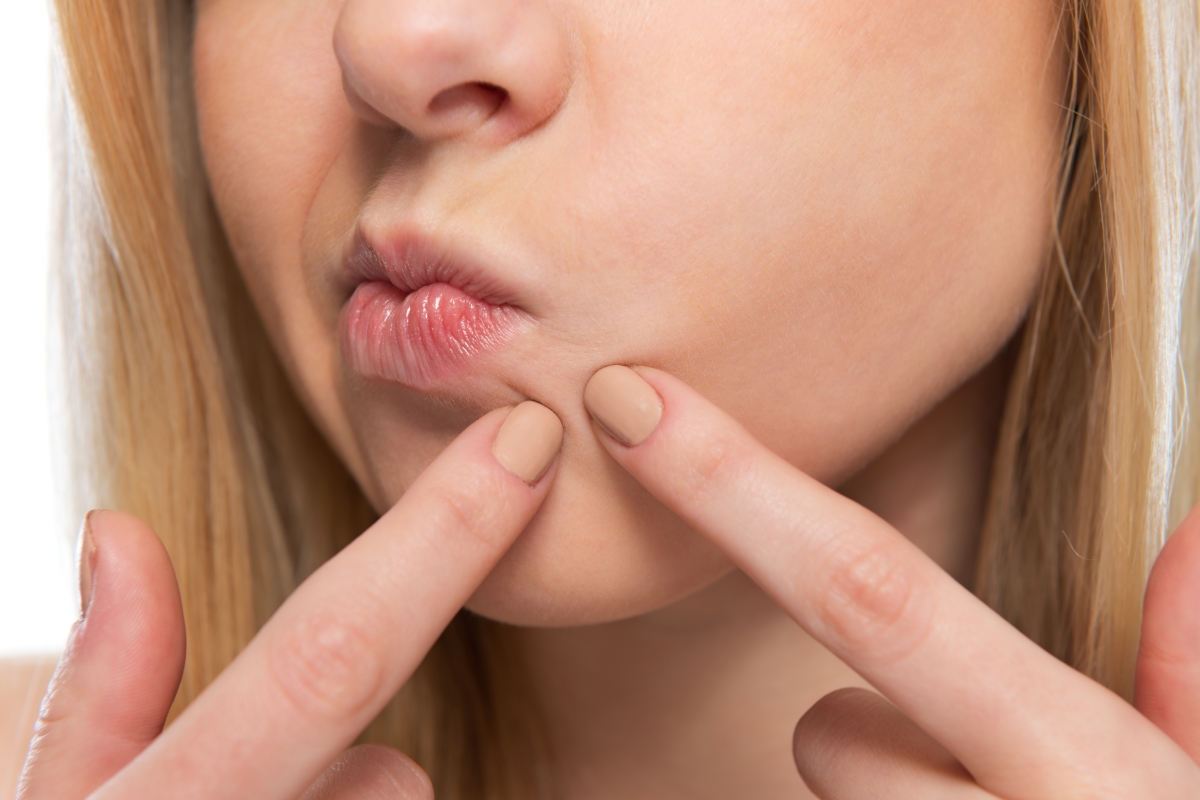8 Do’s and Don’ts from Dermatologists
“Although there are no overnight or immediate cures for acne, you don’t have to stand by and suffer either,” says board-certified dermatologist Meghan Feely, MD, FAAD, who works in private practice in New York and New Jersey and is an attending physician at Mount Sinai’s department of dermatology. “Make sure you use noncomedogenic and oil-free cosmetics, cleansers and sunscreens, and never try to scrub away a pimple, as this can further irritate it and make it worse.”

To treat a deep, painful pimple at home, Dr. Feely recommends the following tips:
- DO wash your skin before treating it. Use a mild, fragrance-free cleanser, and be gentle to your skin while washing.
- DO apply ice to reduce pain and swelling. As soon as you notice the blemish, wrap an ice cube in a paper towel and apply it to the area for five to 10 minutes. Repeat this two more times, with 10-minute breaks between icing.
- DO apply a product that contains 2 percent benzoyl peroxide to the pimple. Available at your local drugstore, this treatment will help kill the bacteria that causes acne. Make sure you apply a very thin layer, as using too much can irritate your skin. While using this product, keep in mind that benzoyl peroxide can bleach fabrics. Avoid letting the medication come into contact with your clothing, and consider using white sheets and towels while using it.
- DO apply a warm compress once a whitehead begins to form. To make a warm compress, soak a clean washcloth in hot water; make sure the water isn’t too hot to avoid burning your skin. Then, apply the warm compress to the pimple for 10 to 15 minutes. Do this three to four times daily until the pimple releases pus and heals.
- DON’T pop, squeeze or pick at the blemish. Doing so can make acne more noticeable and increase your risk of infection, discoloration and scarring.
- DON’T apply toothpaste to the area. Toothpaste contains several ingredients that can clog your pores and irritate your skin, such as hydrogen peroxide, baking soda, alcohol and menthol.
- DON’T apply homemade treatments found online. There is plenty of advice online promoting “natural” remedies for acne, however just because something is natural doesn’t mean it’s good for your skin. Even if a natural ingredient is good for your skin, it could be combined with another ingredient that could be harmful.
- DO visit a board-certified dermatologist to help treat the pimple and prevent future breakouts. If you need an urgent fix, a dermatologist can provide a cortisone injection, which can help the pimple go away in a few hours to days instead of days to weeks. Your dermatologist can also recommend treatments to help prevent future breakouts, such as a retinoid or antibiotics.
Read More: How To Treat Acne And Oily Skin
“Today, virtually every case of acne can be successfully treated, even severe acne,” Dr. Feely says. “However, not everyone’s acne can be treated the same way. If you have a lot of acne, or if your acne isn’t responding to over-the-counter acne medications after four to six weeks, make an appointment to see a board-certified dermatologist.”
If you have even a passing interest in the topic of acne, then you should take a look at the following information. This enlightening article presents some of the latest news on the subject of acne.
1. Avoid Scrubbing and Abrasives
Scrubbing and abrasives should be avoided. Experts have said that they irritate the skin, which should be left intact as a natural barrier against the acne-causing bacteria.
As you may know, sun does kill bacteria, but it doesn’t mean that it won’t harm the skin. Note that the sun also acts as an astringent that dries, tightens and clogs the skin pores. Thus, you should just spend limited time under the sun. At least 15 minutes to the face and arms daily is enough.
3. Avoid Extremely Cold Weather
If extreme heat causes clogging of the pores, extremely cold weather causes it as well. So, avoid extremely cold weather so you don’t freeze and clog pores. It is ideal that you moisturize your face and body, and stay in temperatures ranging from 70 to 80 degrees Fahrenheit.
4. Swimming Does Help
Exercise for stress reduction by swimming in a properly treated indoor swimming pool. But, use the Ozone purified pool if possible. It is interesting to know that the swimming pool water is typically 75 to 85 degrees Fahrenheit, which is well below the normal temperature of 98.6 degrees of your body. Therefore, the swimming water cools your whole body, including the acne affected areas, while providing excellent exercise to the rest of you. This even reduces stress as well as physical attention.
5. Think Clean
Change linens, wash cloths and body towels after each use. It is for the fact that they are great places for acne-causing bacteria to grow and be reapplied to the skin later. Also, wash white facial cloths, pillow covers, as well as personal undergarments daily with Vinegar, tea tree oil or essential oils of Lime, lemon or orange so to lessen the acne-related bacterial development. It is also often suggested that you apply a natural detergent for washing.
Indeed, there are a lot of ways to control and fight acne, but maintaining a healthy lifestyle is so far the best one to consider. It is important to note that healthy lifestyles will lead you to attaining a healthier skin and a healthier body. Changing your unfavorable habits will reward you with better general health, more energy, and clearer skin to show the world.
If you were once afraid to make changes, please don’t be. Of course, the initial affects may be hard to grasp at first, but as you go on, you will find out that you can quickly learn to adapt with them.
This article is Copyright © 2006, Heather Colman. Permission is granted to reprint this article as long as no changes are made, and the entire resource box is included.
Different Causes of Acne Breakout
There are several causes of acne breakout. Many harsh factors that one may encounter in their daily life influence the growth of acne. This does not only include hormonal changes and lifestyle. It may also be inherited from your parents or may be a result of the food and medicines that you orally take. Before undergoing any expensive treatments to prevent acne or buying oral and topical products to treat the skin disease, you must first know the primary cause of acne, especially your acne.
One of the primary causes of acne is the hormonal changes that are happening inside the body. This does not only refer to the adolescent period. Hormonal changes are also seen in pregnant women. Moreover, acne breakout is also a sign for most women that their menstrual period is about to start. Androgen, a hormone present in both men and women, increases during hormonal changes. As a result, the oil ducts are triggered to produce more natural oil in all parts of the body. Studies show that at least eighty percent of people with increased amount of androgen are having acne moderate to severe breakouts depending on their lifestyle. The other twenty percent are fortunate enough not to experience acne breakout because of the healthy and clean lifestyle that they have.
Speaking of lifestyle, this too is a one of the common causes of acne breakout. The way you live your life on a daily basis greatly influences the glow and appearance of your skin. Drinking alcohol and cigarette smoking would not only give you a dull and dry skin but acne breakout as well. Also, lack of exercise and poor diet may also lead to the growth of pimples, blackheads and different kinds of acne. If you have low levels of Vitamin E and Vitamin A in your body, it’s time to take these vitamins found in fruits, vegetables and capsules.
Another one out of many causes of acne among adult, especially for women, is the use of heavy cosmetics that clogs the pores. If the pores are clogged it would eventually result to severe acne breakout. It is alright to use cosmetics, provided that they must not forget to wash their face before going to bed. In case the use of makeup and other cosmetics are necessary, noncomedogenic products are advised to be used. These are makeup products that do not block the pores. This includes lotion, facial moisturizers and skin creams.



